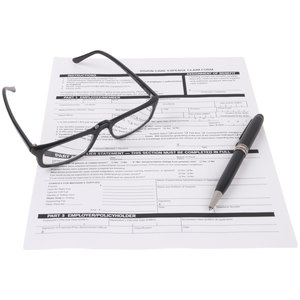
A rental agreement, also called a lease, is the contract that links landlords and tenants. It is intended to protect both parties and lay out what is expected of the property owners and the renters living in the home. Every rental agreement should comply with the landlord and tenant laws in the state where the property is located. Before a rental agreement is signed, use a checklist to make sure everything is covered.
Identifying Information
The rental agreement must contain the names of all tenants living at the property. All adult occupants 18 years of age or older should be listed as legal tenants. It can be hard to evict someone who is not listed on the lease, so make sure you have identifying information for all adults. The location of the property has to be listed, and the name and contact information for the landlord or property manager should also be easily identified. A brief description of the property is often included as well, such as whether it is an apartment unit, a condo or a single family residence.
Term of the Lease
A rental agreement must include the length of the tenancy. Most standard agreements are for a one-year period, but if the landlord and tenant agree on six months or two years, that should be written into the contract. Write out the date the rental agreement goes into effect and the date it expires. Include any terms for renewal and stipulate what needs to be done to cancel the agreement. A fixed-term lease will require a renewal, but a more flexible rental agreement could automatically switch to a month-to-month agreement once the initial term is over.
Paying Rent
A rental agreement establishes in writing how much rent is to be paid each month. It should also include information on when rent is expected to be paid, and how. Outline whether rent should be mailed, dropped off in person, or deposited electronically. Include in the rental agreement information on what happens when rent is late. You will avoid disputes when your rental agreement says how much a late fee will be, on which day of the month rent is officially late, and what the penalties are for a bounced check or other payment problems.
Deposits
The rental agreement must document the amount of any deposits that were collected at the time of lease signing. This might include a security deposit and any additional charges, such as a pet fee or a deposit for the pool key in a development. Some states will require your rental agreement to provide information on how and where the security deposit is being held.
Pets
When pets are allowed in the rental property, there must be instructions provided in the agreement. It should state the name, breed and description of the animal. The rental agreement should also limit the pets to those that have been pre-approved to move in. If there is a pet deposit collected or a pet rent charged, reference those fees in the lease. Explain the process of identifying and paying for pet damage in the home.
Maintenance and Repairs
Explain the process for requesting maintenance. A rental agreement will instruct the tenants on how to get in touch with the landlord when there are minor repairs needed, such as a leaky toilet, as well as major emergencies, such as a flooded basement or a lack of heat. Be specific about what is the tenant's responsibility, such as changing the air filters, and what is the owner's responsibility, such as cleaning out the gutters.
Move Out Procedure
A specific and detailed set of move-out instructions in your rental agreement will spare you the confusion and arguing that can often happen when tenants vacate a property. Tenants should know if they are expected to clean and how much notice they are required to provide before they leave. Let them know you will inspect the property before the security deposit is returned, and follow your state's laws on when and how to return that deposit.
Signatures
The rental agreement is not legally binding until all parties sign and date the document. After the landlord and tenants sign the agreement, distribute a copy to each party. Keep the rental agreement accessible so you can refer to it when questions arise.
References
Writer Bio
Cari Oleskewicz is a writer and blogger who has contributed to online and print publications including "The Washington Post," "Italian Cooking and Living," "Sasee Magazine" and Pork and Gin. She is based in Tampa, Florida and holds a Bachelor of Arts in communications and journalism from Marist College.

